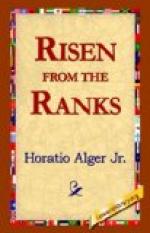“It must be very inconvenient to be poor,” said Fletcher, with a supercilious glance at our hero, who was kneeling before Oscar’s trunk.
“It is,” answered Harry, quietly, “but as long as work is to be had I shall not complain.”
“To be sure!” said Fletcher. “My father is wealthy, and I shall not have to work.”
“Suppose he should fail?” suggested Oscar.
“That is a very improbable supposition,” said Fletcher, loftily.
“But not impossible?”
“Nothing is impossible.”
“Of course. I say, Fitz, if such a thing should happen, you’ve got something to fall back upon.”
“To what do you refer?”
“Mr. Bickford could give you an interest in the tin business.”
“Good-evening!” said Fletcher, not relishing the allusion.
“Good-evening! Of course I shall see you in the city.”
“I suppose I ought not to tease Fitz,” said Oscar, after his visitor had departed, “but I enjoy seeing how disgusted he looks.”
In due time the trunk was packed, and Harry, not without regret, took leave of his friend for the summer.
CHAPTER XIV.
Harry becomes an author.
The closing of the Academy made quite a difference in the life of Centreville. The number of boarding scholars was about thirty, and these, though few in number, were often seen in the street and at the postoffice, and their withdrawal left a vacancy. Harry Walton felt quite lonely at first; but there is no cure for loneliness like occupation, and he had plenty of that. The greater part of the day was spent in the printing office, while his evenings and early mornings were occupied in study and reading. He had become very much interested in French, in which he found himself advancing rapidly. Occasionally he took tea at Mr. Ferguson’s, and this he always enjoyed; for, as I have already said, he and Ferguson held very similar views on many important subjects. One evening, at the house of the latter, he saw a file of weekly papers, which proved, on examination, to be back numbers of the “Weekly Standard,” a literary paper issued in Boston.
“I take the paper for my family,” said Ferguson. “It contains quite a variety of reading matter, stories, sketches and essays.”
“It seems quite interesting,” said Harry.
“Yes, it is. I will lend you some of the back numbers, if you like.”
“I would like it. My father never took a literary paper; his means were so limited that he could not afford it.”
“I think it is a good investment. There are few papers from which you cannot obtain in a year more than the worth of the subscription. Besides, if you are going to be an editor, it will be useful for you to become familiar with the manner in which such papers are conducted.”
When Harry went home he took a dozen copies of the paper, and sat up late reading them. While thus engaged an idea struck him. It was this: Could not he write something which would be accepted for publication in the “Standard”? It was his great ambition to learn to write for the press, and he felt that he was old enough to commence.




